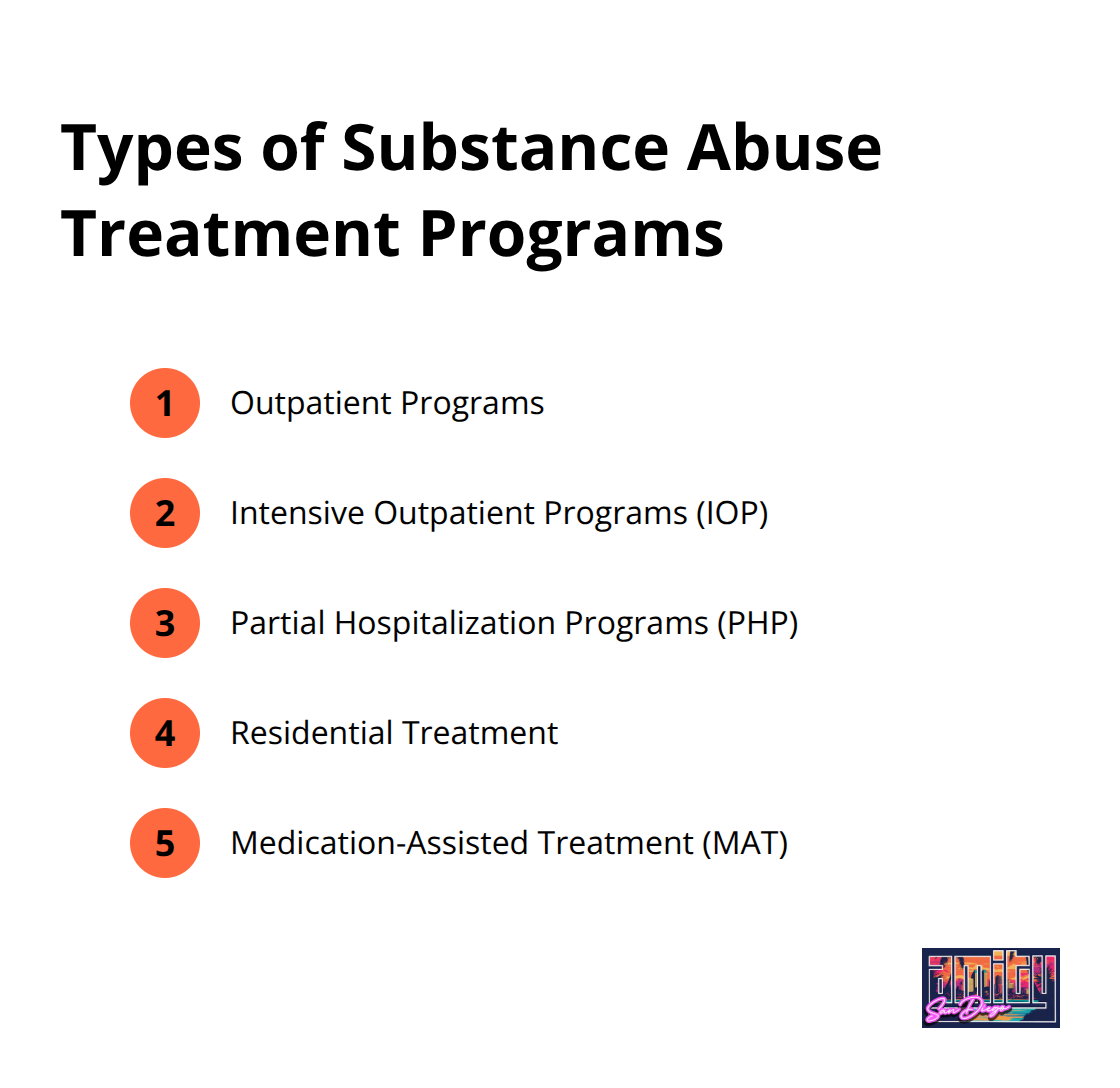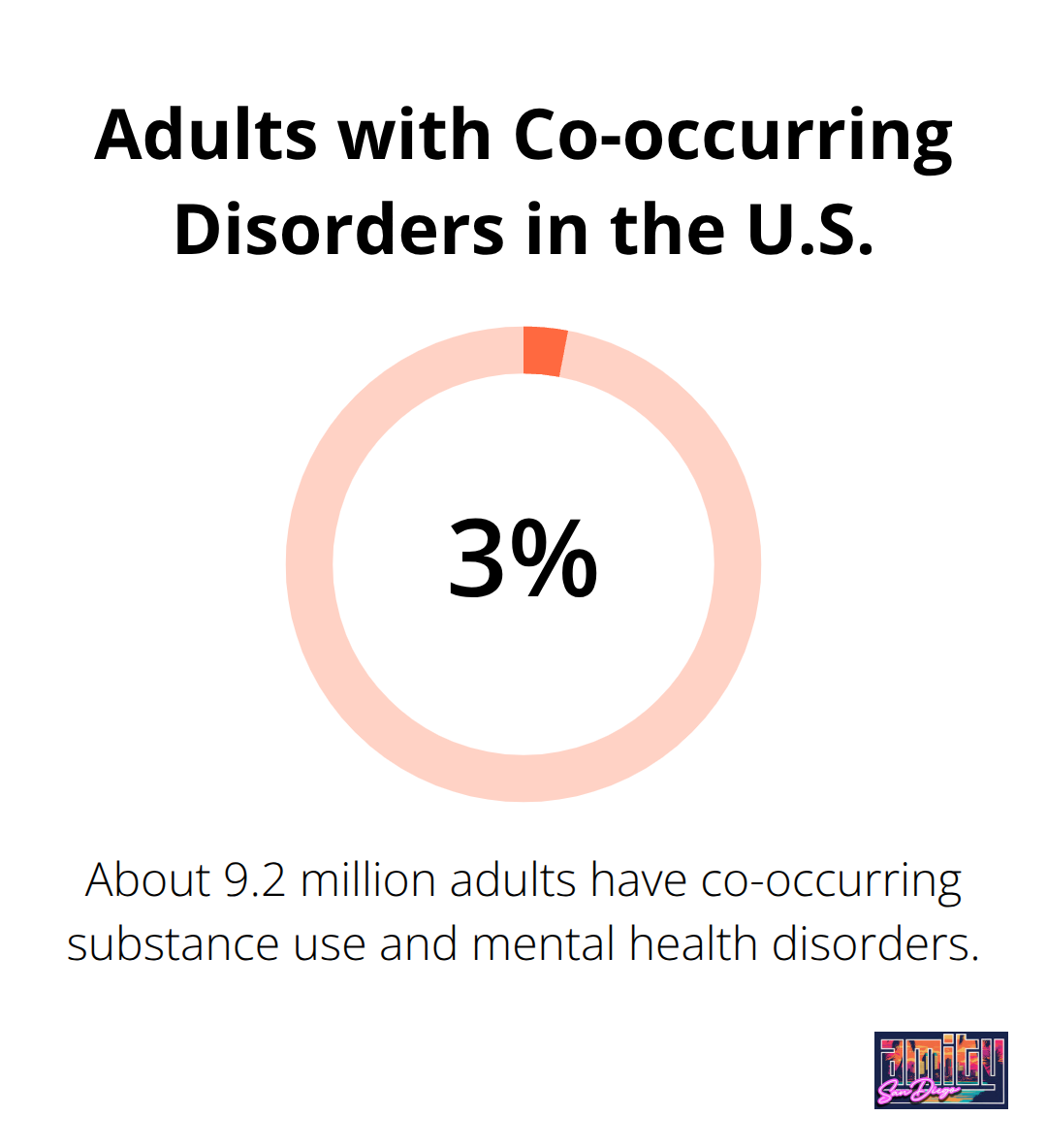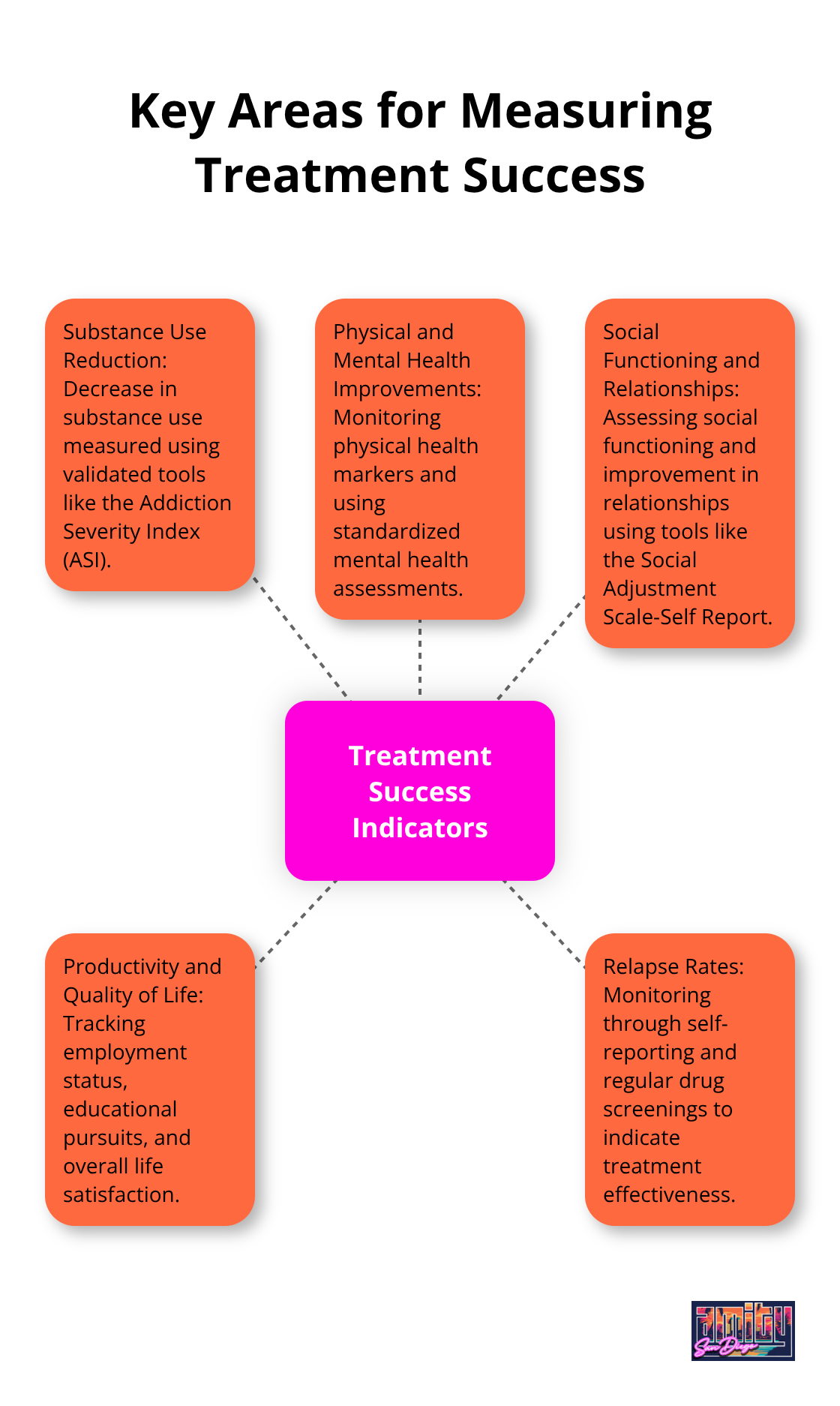At Amity San Diego, we’ve seen firsthand the transformative power of effective substance abuse treatment.
The effectiveness of substance abuse treatment programs can vary widely, depending on several key factors. In this post, we’ll explore what makes treatment successful and how to measure its impact.
Understanding these elements is crucial for anyone seeking help or supporting a loved one on their journey to recovery.
What Is Substance Abuse Treatment?
Definition and Purpose
Substance abuse treatment is delivered in two basic settings or environments: inpatient and outpatient. It addresses the physical, psychological, and social aspects of addiction. The primary goal is to assist people in stopping substance use, maintaining a drug-free lifestyle, and achieving productive functioning in their families, workplaces, and communities.
Types of Treatment Programs
Different treatment programs cater to various needs and severity levels:

- Outpatient Programs: These allow clients to live at home while attending regular therapy sessions. They suit those with milder addictions or as a step-down from more intensive care.
- Intensive Outpatient Programs (IOP): IOPs provide a higher level of care than standard outpatient treatment, with more frequent and longer sessions.
- Partial Hospitalization Programs (PHP): PHPs offer comprehensive treatment during the day while allowing clients to return home in the evenings.
- Residential Treatment: This involves living at a treatment facility full-time, providing 24/7 support and intensive therapy.
- Medication-Assisted Treatment (MAT): MAT combines behavioral therapy with FDA-approved medications to treat substance use disorders (particularly opioid and alcohol addictions).
The Importance of Personalized Treatment Plans
Every individual’s journey with addiction is unique, which makes personalized treatment plans essential for success. Individualized treatment plans are customized to meet the unique needs and requirements of the individual. This means that the treatment is tailored specifically for each person.
Personalized plans often include a combination of evidence-based therapies such as Cognitive Behavioral Therapy (CBT), Dialectical Behavior Therapy (DBT), and trauma-informed care. They also consider factors like co-occurring mental health disorders, family dynamics, and personal history.
Holistic Approach to Recovery
Effective substance abuse treatment extends beyond addressing the addiction itself. It should encompass a holistic approach that nurtures the mind, body, and spirit. Holistic drug treatment integrates evidence-based practices with alternative therapies to provide a well-rounded approach to recovery.
A comprehensive approach to treatment addresses the root causes of addiction and equips individuals with the tools they need for long-term recovery. Professional help is a vital first step towards reclaiming one’s life from addiction.
The next chapter will explore the factors that influence the effectiveness of substance abuse treatment, including early intervention, comprehensive care, and the role of ongoing support in maintaining recovery.
What Makes Treatment Effective?
At Amity San Diego, we have identified key factors that significantly influence the success of substance abuse treatment. Our experience shows that early intervention, a comprehensive approach, and ongoing support are essential for long-term recovery.
The Power of Early Intervention
Early intervention can dramatically improve treatment outcomes. Well-supported scientific evidence shows that substance use disorders can be effectively treated, with recurrence rates no higher than those for other chronic illnesses. Clients who seek help sooner often have shorter treatment durations and higher success rates.
Addressing Co-occurring Disorders
Many individuals struggling with substance abuse also face mental health challenges. Integrated Treatment (IT) has proved effective in treating patients with Substance Use Disorders (SUD) co-occurring with severe Mental Disorders (MD).
The Substance Abuse and Mental Health Services Administration (SAMHSA) reports that about 9.2 million adults in the U.S. have co-occurring disorders. An integrated approach addresses both substance use and mental health issues, which has shown to improve overall treatment outcomes significantly.

The Impact of Treatment Duration
The length and intensity of treatment play a vital role in recovery success. While there’s no one-size-fits-all approach, research consistently shows that longer treatment durations lead to better outcomes.
A study by the National Institute on Drug Abuse found that treatment lasting at least 90 days is more likely to lead to sustained recovery. Clients who commit to longer-term treatment programs often show more substantial improvements in their overall well-being and have lower relapse rates.
Aftercare: The Foundation of Sustained Recovery
Recovery doesn’t end when formal treatment concludes. Aftercare and ongoing support are vital components of effective substance abuse treatment. Aftercare programs include regular check-ins, support groups, and continued therapy sessions.
The Role of Evidence-Based Therapies
Evidence-based therapies such as Cognitive-Behavioral Therapy (CBT) form the backbone of effective substance abuse treatment. These therapies help individuals identify and change negative thought patterns and behaviors associated with substance use.
A meta-analysis published in the Journal of Consulting and Clinical Psychology found that CBT was effective in treating alcohol or other drug use disorders.
The next chapter will explore how we measure the success of substance abuse treatment, including key indicators of progress and long-term recovery outcomes.
How We Measure Treatment Success
At Amity San Diego, we focus on tangible, measurable outcomes in substance abuse treatment. Our approach evaluates five key areas that indicate successful recovery.

Substance Use Reduction
The most direct measure of treatment success is a decrease in substance use. We use validated tools like the Addiction Severity Index (ASI) to track progress.
Physical and Mental Health Improvements
Recovery extends beyond abstinence; it encompasses overall well-being. We monitor physical health markers (such as liver function tests and blood pressure). For mental health, we use standardized assessments like the Beck Depression Inventory and the Generalized Anxiety Disorder-7 scale.
A recent study reported that integrated treatment for co-occurring disorders led to improvements in mental health symptoms among participants.
Social Functioning and Relationships
Healthy relationships form a cornerstone of long-term recovery. We assess social functioning using tools like the Social Adjustment Scale-Self Report (SAS-SR). Clients often report improved communication with family members and the ability to form new, supportive relationships.
Productivity and Quality of Life
Returning to work or school marks a significant milestone in recovery. We track employment status, educational pursuits, and overall life satisfaction. The World Health Organization Quality of Life (WHOQOL) assessment helps us quantify these improvements.
Relapse Rates
Lower relapse rates indicate treatment effectiveness (although relapse doesn’t mean treatment failure). We use a combination of self-reporting and regular drug screenings to monitor this.
According to NIDA, treatment enables people to counteract addiction’s disruptive effects on their brain and behavior and regain control of their lives.
Final Thoughts
The effectiveness of substance abuse treatment programs depends on several key factors. Early intervention, personalized care, and a comprehensive approach that addresses co-occurring disorders improve outcomes significantly. Longer treatment durations and strong aftercare support play a vital role in sustained recovery.
We at Amity San Diego have witnessed how professional help transforms lives. Our outpatient programs offer evidence-based treatment in a supportive environment. We combine medical expertise with compassionate care to address the whole person (body, mind, and spirit).
If you or a loved one struggles with addiction, recovery is possible. For those seeking addiction treatment in San Diego, our team at Amity San Diego stands ready to help. We offer personalized care plans and ongoing support to guide you towards lasting recovery.

